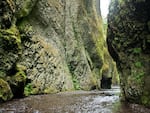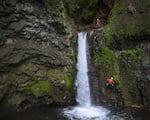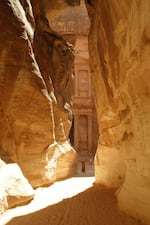
The earth breaks open. Water trickles into the fissure. Millions of years pass. A slot canyon is born.
THANKS TO OUR SPONSOR:Narrow, deep and at times teeming with danger, slot canyons beg for exploration. Valhalla, deep in the Mount Jefferson Wilderness in Oregon, has proved itself to be an epic canyoneering adventure.
To appreciate what makes Valhalla so special, here is a closer look at the geological wonders known as slot canyons.
A slot canyon is a very narrow gorge with steep, high walls often made from soft rock such as basalt or sandstone. Many boast waterfalls at their tail ends. Deeper than they are wide, these canyons can be treacherous for those who enter — they are prone to flash floods and offer few ways in or out.

Slot canyons are not all the same, but they are formed through the same basic geological function: erosion.
"Erosion is the key," said Scott Burns, professor emeritus of geology at Portland State University. "Something has (to) remove (the rock), and that’s generally going to be water."
A fault or crack in rock opens, exposing the edges of the newly exposed rock to erosion from water. In the Northwest, these cracks open because of pressure from tectonic movement.
"The whole Pacific Northwest is moving," Burns said. "What is happening is rocks are put under pressure . and they bend, bend, bend, break. And when they break, then you have got a crack."
THANKS TO OUR SPONSOR:Water works its way into the crack, and over millions of years, it slowly chips away at the rock, eventually forming a very deep, narrow canyon.
 100 feet tall." width="" />
100 feet tall." width="" />
We may not know about some of the best slot canyons in the Pacific Northwest because they are buried deep in forests. Such was the case with Valhalla.
The dense foliage typically found around the edges of slot canyons makes it hard to see them from above. Many slot canyons are nearly impossible to explore due to high waters and other obstacles, such as logjams, which pile against the narrow walls.
"We still have a lot of these around the Pacific Northwest that people really haven't discovered just because they are covered up by trees," Burns said. That was the case with the Valhalla slot canyon.
The most well-known slot canyon in the Portland area is the Oneonta Gorge. "Crack in the Ground," a volcanic fissure in Oregon's Lake County popular with hikers and explorers, can also be considered a slot canyon. Lava Canyon in the Mount Saint Helens National Volcanic Monument in Washington lay buried until the May 1980 eruption.
"Nobody knew it was there until we had the May 18 eruption in 1980 and huge lahars—" volcanic mudflows "—came down and completely scoured out this canyon, which is absolutely beautiful," Burns said.

There are thousands of slot canyons the world over, with many of the most famous ones right here in the West.
Utah is home to the largest concentration of slot canyons in the world due to the state's abundance of soft sandstone, which erodes easily in high winds and water. There are more than 1,000 slot canyons in Utah.
Thanks to its supporting role in the film "Indiana Jones and the Last Crusade," one of the world's best-known slot canyons is the serpentine entrance to the ancient city of Petra in southwestern Jordan. Visitors pop through a narrow slot canyon into a majestic "lost" city carved into the orange sandstone cliffs.
Like its more famous counterparts, Valhalla is a sight to behold, though, the casual hiker will likely never step foot into it. Rugged and remote, this slot canyon is best seen on the screen. And that's where Oregon Field Guide's Discovering Valhalla: Oregon's Hidden Gorge, airing Feb. 4, comes in.